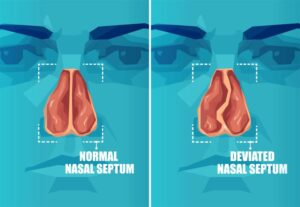
There is a thin wall of cartilage and bone in your nose known as the septum. Ideally, it should go straight down the center of your nose. But if it is crooked or incorrectly placed, you have what is known as a deviated septum. This issue is known for causing mild breathing difficulties, but that barely scratches the surface of the problems that can arise from a severely deviated septum. Really, it could endanger your health in a number of ways:
Chronic Sinusitis
If you have a severely deviated septum, you may notice that your sinuses feel congested more often than not. The misalignment of the septum can block normal airflow and drainage within your nasal passages. As a result, mucus and bacteria can build up, creating the perfect environment for recurrent infections and inflammation. This condition, known as chronic sinusitis, can cause facial pain, pressure, headaches, and a sense of fullness in your cheeks and forehead. Over time, untreated sinusitis can disrupt your daily life and may even lead to more serious infections.
Obstructive Sleep Apnea
When your septum is severely deviated, it can significantly narrow your nasal passages, making it difficult to breathe freely while you sleep. This obstruction increases your risk of developing obstructive sleep apnea, a disorder that causes you to stop breathing multiple times throughout the night. Sleep apnea does not just leave you feeling tired during the day; it can also raise your risk of high blood pressure, heart disease, and stroke.
Nosebleeds
A crooked septum can cause air to flow unevenly through your nose, leading to dryness and irritation on one side. The delicate tissues lining your nasal passages become more prone to cracking and bleeding. If you notice that you have frequent nosebleeds, especially from the same nostril, your deviated septum may be to blame. Recurrent nosebleeds can be unsettling and inconvenient, and in some cases, they may require medical attention to stop the bleeding and address the underlying issue.
Asthma
If you already have asthma, a severely deviated septum can worsen your symptoms. Blocked nasal passages can force you to breathe through your mouth, which bypasses the natural filtration system of your nose. This allows more irritants and allergens to reach your lungs, potentially triggering asthma attacks or making your condition harder to control. Even if you do not have a history of asthma, the chronic inflammation and breathing difficulties caused by a deviated septum may increase your risk for respiratory problems over time.
Fixing a Deviated Septum
If you suspect that your septum is severely deviated, you should consult with an ear, nose, and throat specialist. After a thorough examination, your doctor may recommend septoplasty, a surgical procedure to straighten the septum and restore normal airflow. This procedure can provide long-lasting relief from congestion, sinus infections, nosebleeds, and sleep disturbances. After your procedure, you may find that both your health and daily quality of life are greatly improved!
Meet the Practice
Dr. Gary Wiesman is an ear, nose, and throat specialist and highly experienced facial plastic surgeon. He has helped many patients find freedom from a deviated septum! If you are concerned that your septum is interfering with your breathing or endangering your health, Dr. Wiesman and our team are ready to consult with you. Contact our Chicago office at 312-796-5550.

